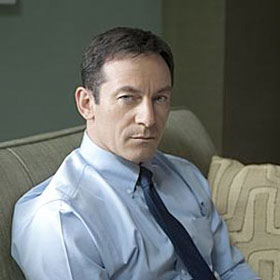Awake

4/5
When writer Kyle Killen concocted Lone Star, a blackly comic dramady about a con-man living a secret double life, split between two families living at opposite ends of Texas, Fox axed the idea after a meager six episodes. Clearly unable to wrestle the idea of dissociative states from his mind – most recently he penned the Jodi Foster/Mel Gibson crazyfest, The Beaver – Killen has added a splash of the fantastical and brought the idea to NBC in the guise of a procedural – the insulin to NBC's diabetic.
Opening with a bone-shaking automobile accident, the series sets itself up a fantasy-crime drama, laced with dark tinges of melancholia, which sees Police Detective Michael Britten (Jason Isaacs) hopelessly trying to reconcile a life in which he shifts between two worlds each time he opens his eyes having laid down to go to sleep. In one world his wife (Laura Allen) is dead and he is struggling to connect with his son (Dylan Minette), while in the other his wife is alive but their relationship is shattered by grief over their son's death.
In both worlds Britten is trying to get back on the job, albeit with different partners (Steve Harris and Wilmer Valderamma), and in both worlds he has been assigned a department therapist (B.D. Wong for the 'wife reality' and Cherry Jones for the 'son reality'). To help keep track of where he is Britten wears a colored band on his arm – green for 'son' and red for 'wife' – and the appropriate gel is applied to the lighting. It's early days, of course, but already you can see the pieces moving into position. We're guessing maybe four episodes before a comforting arm on the shoulder from Britten's dead wife's former tennis partner becomes an embrace, and what then?
About as high-concept as it gets for what is ostensibly a real-world drama, Awake is a percolating blend of competing ideas. Inexplicably turning reality on its head, while still asking characters to solve real-world problems is a neat little device that goes all the way back to Twin Peaks. While the psychology of the show, flowery and dryly delivered as it is, doesn't extend beyond freshman semester undergrad, the dueling therapists recalls the more intimate moments of the likes of In Treatment. Britten's day job gives the show the comfortable crutch of your bog standard Law & Order-esque case-of-the-week, which offers some handy forward momentum for each individual episode. And tying it altogether is a haunting familial drama about loss and the nature of grief.
As it stands, the series will live and die based on which of these strings the showrunners choose to pluck with the most frequency. If they choose to play down the supernatural overtones – like Fox does with Alcatraz – then we're in for a snoozefest. But if they play to the more interesting elements – the gentle grace and unnerving symmetry, where clues from a case in one reality bleed over and are used to solve a case in the other – then this could really open up into a fascinating character study.
The lynchpin, of course, is Jason Isaacs. So as not to tip the audience off, or be perceived to showing favor to one reality over another, it is necessary for Isaacs to appear in virtually every scene and for the supporting characters to only be witnessed from his perspective, which over time is going to make it difficult for them to properly evolve.
Luckily for the show they have in Isaacs an actor of supreme ability, and he capably sells the grief, the self-doubt, and the potentially crippling confusion with perfect, understated subtlety. An actor with a cult following, who has spent much of his career in the annals of supporting players, and faffing about with the likes of Harry Potter, Isaacs has never managed to grab that role that will elevate him to A-list. Given the stature of intelligent, scripted television these days, as compared to Hollywood's white noise, there is no reason why this couldn't be it.
RELATED ARTICLES
Get the most-revealing celebrity conversations with the uInterview podcast!







Leave a comment